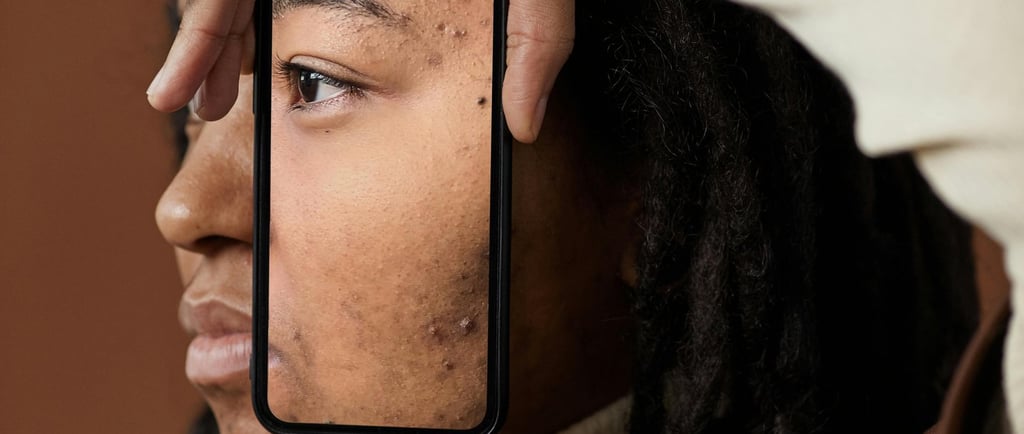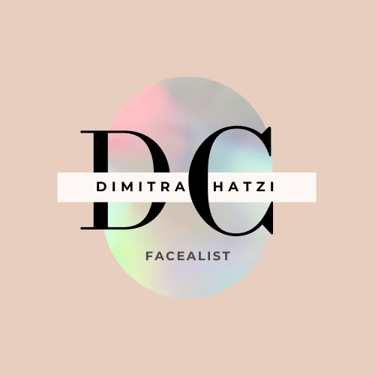Science-Backed Skincare on a Student Budget: Beat Acne Without Breaking the Bank
Teenage acne can be frustrating and impact self-esteem during significant changes. Skincare options can be expensive, but managing acne on a budget is possible. Understand your skin's needs and follow budget-friendly strategies for clearer, healthier skin.
TEENAGERS SKINSKINCARE & COSMETICSACNE
Dimitra Chatzi
4/26/20246 min read


The Struggle with Teenage Acne
Dealing with teenage acne can be a frustrating experience. At a time when your body is undergoing significant changes, acne can add to the stress, impacting self-esteem. You may feel overwhelmed by the countless skincare options, each promising clear skin at a cost that often stretches beyond a reasonable budget. But managing acne effectively doesn't have to break the bank. With a focus on understanding your skin's needs and implementing a few tried and tested budget-friendly strategies, you can confidently navigate this challenge, working towards a more transparent, healthier complexion.
Understanding Acne: What Causes Breakouts in Teens?
Acne in your teen years is often caused by hormonal changes that increase oil production in your skin. This excess oil can mix with dead skin cells, clogging pores and hair follicles. Bacteria naturally living on the skin can infect these blocked pores, leading to red, swollen pimples. Other factors contributing to breakouts include:
Genetic predisposition: If your family members have acne, you'll likely have it.
Stress: It can worsen acne by increasing hormone levels.
Diet: High glycemic foods may contribute to acne in some individuals.
Poor hygiene: Irregular cleansing can exacerbate skin problems.
A consistent skincare routine tailored to manage oiliness and inflammation can help control acne.
The Importance of Consistency in Skincare Routines
Maintaining a consistent skincare routine is crucial for controlling acne, particularly on a budget. Consistently using the same products allows your skin to adjust to them and reap the full benefits over time. Regular application helps to maintain a balance, preventing the overproduction of oil, which can lead to breakouts. Additionally, consistency aids in the gradual clearing of pores and the reduction of inflammation. To achieve clear skin, it's essential to:
Cleanse daily to eliminate impurities.
Use treatments regularly to target specific concerns.
Moisturize to keep skin hydrated.
Apply sunscreen to protect from damaging UV rays.
Remember, skipping steps or sporadically changing products may disrupt your skin's balance, negating any progress made.
Daily Cleansing: The First Defense Against Acne
Implementing a daily cleansing routine is critical in combating acne. You should:
Select a gentle, non-comedogenic cleanser suited to your skin type, avoiding harsh ingredients that can strip natural oils.
Wash your face twice daily, in the morning and evening, to remove impurities and excess oil.
Use lukewarm water, as extreme temperatures can irritate your skin, potentially exacerbating acne.
Apply the cleanser with your fingertips, employing a circular motion to lift grime gently and unclog pores.
Rinse thoroughly, ensuring all cleanser residue, which could irritate the skin or block pores, is removed.
Gently pat your face dry with a clean towel to minimize irritation to sensitized acne-prone skin.
This foundational step sets the stage for a budget-friendly acne prevention routine.
Moisturizing Matters: Hydration for Acne-Prone Skin
If you have acne-prone skin, you might think moisturizing will exacerbate your breakouts, but this is a common misconception. Hydration is crucial, even for oily skin types. By skipping the moisturizer, you could encourage your skin to produce more oil, potentially leading to more breakouts.
Choose non-comedogenic moisturizers, those specifically formulated not to block pores.
Look for ingredients like hyaluronic acid and glycerin, which provide moisture without added oil.
Apply moisturizer while your skin is still damp to lock in hydration.
Opt for an oil-free formula if you're concerned about feeling greasy.
Hydrated skin is healthy, and maintaining moisture balance can help keep acne in check.
Exfoliation: Shedding Light on Clearer Skin
Exfoliation is pivotal in your budget-friendly acne-care arsenal. By gently removing dead skin cells, you ensure pores remain unclogged, mitigating acne breakouts. Avoid scrubs and use budget-friendly chemical exfoliants containing beta-hydroxy acids (BHAs) and enzymatic peeling masks. Use enzymatic peeling masks 1 time a week and exfoliant toner with (BHAs) every evening to slough off dead cells and reveal more transparent, radiant skin beneath. Always follow with a moisturizer to maintain skin barrier integrity, and remember, over-exfoliating can backfire, resulting in increased sensitivity and irritation.
Sun Protection: Guarding Against Acne Aggravation
Excessive sun exposure can worsen acne by inflaming your skin and clogging pores with dead cells. An affordable solution is incorporating sun protection into your daily acne care routine. Use non-comedogenic sunscreens that don't exacerbate acne. Look for ingredients like zinc oxide or titanium dioxide, which are perfect for sensitive, acne-prone skin. Apply sunscreen generously 15 minutes before going outdoors, and reapply every two hours. Cover with hats and loose, protective clothing, and seek shade during peak sun hours to prevent irritation and clear skin.
Diet and Acne: Nutrition Tips for Healthier Skin
Your diet significantly impacts your skin's health. To manage acne, follow these nutrition tips:
Limit Dairy and Sugar: High-glycemic foods and dairy can trigger acne in some individuals. Try reducing your intake to see if your skin improves.
Hydrate Adequately: Drink plenty of water throughout the day to flush out toxins that can cause acne.
Increase Zinc and Omega-3s: Incorporate foods rich in zinc, like pumpkin seeds, and Omega-3s, found in fish and flaxseeds, to help reduce inflammation.
Eat a Rainbow: Consuming various fruits and vegetables provides essential vitamins and antioxidants that promote skin health.
Avoid Processed Foods: Processed and fast foods often contain unhealthy fats and additives that may exacerbate acne. Choose whole and unprocessed foods instead.
Remember, a balanced diet contributes to overall well-being and can be a critical factor in achieving clearer skin.
Stress Management Techniques to Combat Acne
Managing stress is as vital for your skin as it is for your overall well-being. Remember, when you're stressed, your body produces more cortisol, which can escalate acne. Here are some budget-friendly techniques to consider:
Practice Deep Breathing: Dedicate a few minutes daily to deep breathing exercises. This simple technique can significantly lower stress levels.
Exercise Regularly: Physical activity increases blood circulation and releases endorphins, reducing stress and potentially improving your skin's appearance.
Get Enough Sleep: Aim for 7-9 hours of quality sleep each night to allow your body and skin to rejuvenate.
Mindfulness and Meditation: Engage in mindfulness practices to help center your thoughts and ease your mind.
Stay Hydrated and Eat Balanced: A well-hydrated body and a balanced diet can help manage stress and support skin health.
Affordable Over-the-Counter Products Worth the Investment
To combat acne without breaking the bank, several over-the-counter solutions offer formidable results. Prioritize products with proven ingredients:
Look for salicylic acid cleansers to unclog pores and reduce inflammation.
Invest in benzoyl peroxide treatments to kill acne-causing bacteria and clear blemishes.
Add a non-comedogenic moisturizer to your routine to balance skin hydration.
Choose oil-free, SPF-containing sunscreens since sun damage can exacerbate acne.
Consider alpha hydroxy acid (AHA) exfoliants to gently remove dead skin cells, promoting a clearer complexion.
These selections offer targeted action against acne while respecting your budget, but do not use it all together.
DIY Treatments: Natural Remedies to Soothe Acne
As a person, I tried everything and tested it with clients who do not prefer natural remedies because they do not work with my clients and me.
Expert Advice: When to See a Dermatologist
When managing acne on a budget, it's crucial to recognize when professional help is needed. You should schedule an appointment with a dermatologist if:
Over-the-counter products haven't improved your acne after 6-8 weeks.
Your acne is severe, causing deep cysts or significant inflammation.
You're experiencing scarring or discoloration due to acne.
Your self-esteem or mental well-being is being affected by your skin's condition.
You have any signs of infection, such as excessive redness, pain, or pus.
A specialist can provide tailored treatments and guidance to ensure your skin stays healthy without unnecessary expenditures.
Creating a Personalized Skincare Plan on a Budget
To tailor a budget-friendly skincare routine, identify your skin type: oily, dry, combination, or sensitive. Then, seek affordable cleansers, moisturizers, and treatments within your budget. Here's a step-by-step plan:
Research: Use online resources or consult an Esthetician for budget-friendly recommendations for your skin type.
Cleanse Gently: Select a gentle cleanser that doesn't strip your skin's natural oils.
Exfoliate: Opt for a low-cost chemical exfoliant, like products with salicylic acid, to keep pores clear.
Moisturize: Hydration is essential; find a non-comedogenic moisturizer that suits your skin type.
Sun Protection: Use broad-spectrum sunscreen daily; even inexpensive brands are influential.
Treatment Products: Consider generic benzoyl peroxide or adapalene gel for acne.
Remember, consistency and patience are crucial. Your personalized, cost-effective skincare plan will take time to show results, so keep your routine simple and steady.
Conclusion: Long-Term Commitment to Clearer Skin
Achieving and maintaining clearer skin on a budget is entirely possible with consistency and dedication to your skincare routine. Remember, simple yet effective products are essential, and paying attention to how your skin reacts over time is crucial. Regularly cleanse, treat, and moisturize, considering that less can be more. Prioritize protection against the sun and keep your skin's hydration in check. It's not about quick fixes but rather a sustainable routine you can commit to long-term. Stay patient, and your straightforward skin journey will be a rewarding one.
Sources:
https://www.ncbi.nlm.nih.gov/pmc/articles/PMC3997205/
https://www.aad.org/public/diseases/acne/skin-care/moisturizer
https://acneclinicnyc.com/pore-clogging-ingredients/
Hashtags:
#acneawareness #healthyskin #teenskincare #skincaretips #MunichAcne #teenproblems #skinhack #dimitrachatzi
